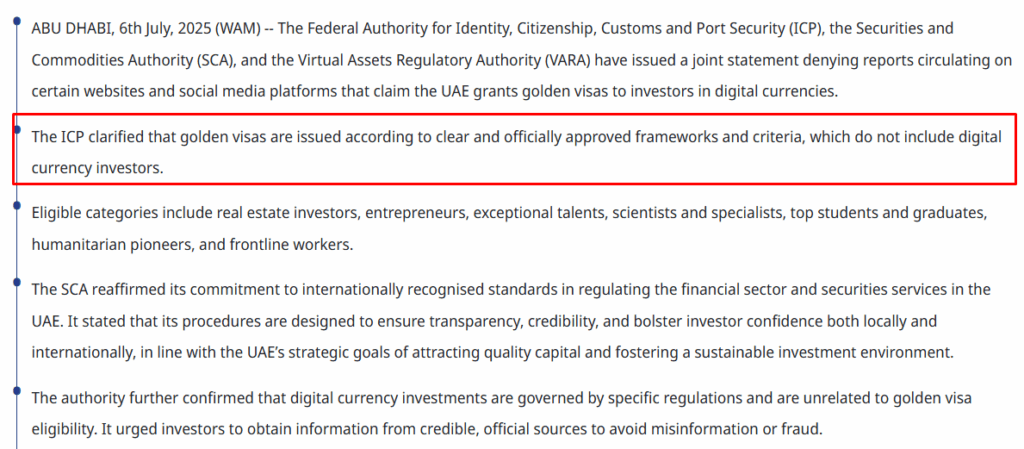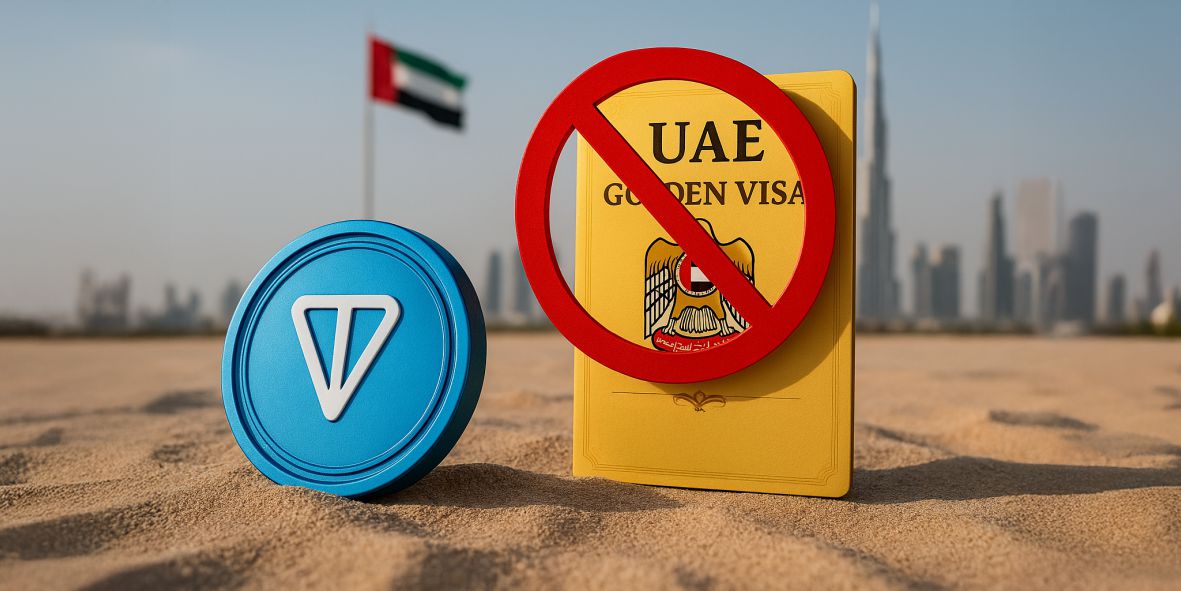Key Takeaways
- United Arab Emirates (UAE) regulators denied that Toncoin (TON) staking qualifies for the UAE golden visa.
- TON claimed investors could secure residency by staking $100,000 and paying $35,000.
- Toncoin surged, then dropped about 6% after the UAE rejected the offer.
- Authorities clarified TON is not licensed and warned investors to verify information.
- The episode highlights the risks of unverified crypto promises tied to legal benefits.
TON’s Bold Promise Falls Flat
Three of the United Arab Emirates (UAE)’s top regulatory authorities have categorically denied claims that investing $100,000 in Toncoin (TON) staking through The Open Network qualifies individuals for a golden visa. The agencies clarified that digital asset holdings or related activities do not meet all the criteria for long-term residency. The market soon reacted, TON coin fell about 6 percent, dropping from around $3.05 at its weekend peak to approximately $2.83 at the time of publication.
Over the weekend, the blockchain platform announced an ambitious program, claiming that investors who stake $100,000 worth of Toncoin for three years and pay a $35,000 processing fee would secure 10-year golden visas within seven weeks. The platform, which spun out of Telegram, positioned this as a revolutionary pathway that bypassed traditional investment requirements for the UAE golden visa.
UAE Clears the Air
To crush this sweeping claim, the Emirates News Agency published a joint response from three federal entities – the Federal Authority for Identity, Citizenship, Customs and Port Security, the Securities and Commodities Authority, and the Virtual Assets Regulatory Authority (VARA). This stopped all the hype and excitement in crypto communities about the easy path to UAE residency.

UAE regulators have denied that staking $100,000 in Toncoin through The Open Network grants a golden visa: Source: wam.ae
The TON Golden Visa offer was announced by Max Crown, the CEO of the TON Foundation, on X and on the official TON Foundation channels and website. The offer says that the TON route requires “no specific profession, degree, or job offer”, which is a stark contrast to established golden visa criteria that demand substantial real estate investments, exceptional talents, or entrepreneurial achievements, among other things. The official program, launched in 2019, enables foreign nationals and their families to live, work, and study in the UAE.
Markets Always React Sharply to High-Stakes Announcements
Toncoin’s price jumped about 10% to around $3.05 as investors reacted to what looked like a simpler way to gain UAE residency. But the euphoria was short-lived. After the UAE government’s denial was published, Toncoin retreated to $2.83, erasing gains and highlighting the volatility that speculation can create in cryptocurrency markets.
Former Binance CEO Changpeng “CZ” Zhao had expressed interest in pursuing a similar deal for BNB tokens, but only if the program represents an official government partnership. He was wise to be careful, as can be seen now. “I have not been able to verify with an official source yet,” Zhao posted on X before the UAE authorities released their statement. He has questioned whether the TON program was legitimate or simply a costly intermediary service charging $35,000 to process standard applications.
Total Regulatory Clarity Emerges From UAE
In the official statement, VARA has stated that TON is neither licensed nor regulated by VARA. It strongly urged investors and consumers to deal exclusively with fully licensed and regulated companies when engaging in services and investments related to virtual assets.
“Digital currency investments are governed by specific regulations and are unrelated to golden visa eligibility,” the joint statement declared. Authorities urged investors to seek information from credible, official sources to avoid misinformation and potential fraud.
After the official statement of the UAE government, TON has not issued a response by publication time. The foundation’s CEO, Max Crown, had thanked “partners in the UAE for their vision, support, and trust” before authorities clarified no such partnership existed.
Lessons for Crypto Investors Worldwide
The incident underscores the challenges facing crypto projects seeking mainstream adoption through government partnerships. While the UAE positions itself as a blockchain hub, attracting many crypto companies to the country’s free zones, regulators maintain strict boundaries between digital asset activities and residency programs.
The episode serves as a reminder that investors must verify claims through official channels, particularly when substantial sums and legal status are involved. As countries worldwide continue developing their digital finance ecosystem, clear communication between crypto projects and government authorities becomes increasingly crucial for legitimate innovation.
Read more: Dubai’s VARA Warns Firms Against Misleading Claims in Tokenization Pilot



